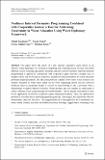| dc.contributor.author | Zarghami, Mahdi | |
| dc.contributor.author | Safari, Nasim | |
| dc.contributor.author | Szidarovszky, Ferenc | |
| dc.contributor.author | Islam, Shafiqul | |
| dc.date.accessioned | 2016-12-01T20:53:05Z | |
| dc.date.available | 2016-12-01T20:53:05Z | |
| dc.date.issued | 2015-07 | |
| dc.date.submitted | 2015-02 | |
| dc.identifier.issn | 0920-4741 | |
| dc.identifier.issn | 1573-1650 | |
| dc.identifier.uri | http://hdl.handle.net/1721.1/105505 | |
| dc.description.abstract | This paper shows the utility of a new interval cooperative game theory as an effective water diplomacy tool to resolve competing and conflicting needs of water users from different sectors including agriculture, domestic, industry and environment. Interval parameter programming is applied in combination with cooperative game theoretic concepts such as Shapley values and the Nucleolus to provide mutually beneficial solutions for water allocation problems under uncertainty. The allocation problem consists of two steps: water resources are initially allocated to water users based on the Nash bargaining model and the achieved nonlinear interval parameter model is solved by transforming it into a problem with a deterministic weighted objective function. Water amounts and net benefits are reallocated to achieve efficient water usage through net benefit transfers. The net benefit reallocation is done by the application of different cooperative game theoretical methods. Then, the optimization problem is solved by linear interval programming and by converting it into a problem with two deterministic objective functions. The suggested model is then applied to the Zarrinehrud sub-basin, within Urmia Lake basin in Northwestern Iran. Findings suggest that a reframing of the problem using cooperative strategies within the context of water diplomacy framework - creating flexibility in water allocation using mutual gains approach - provides better outcomes for all competing users of water. | en_US |
| dc.publisher | Springer Netherlands | en_US |
| dc.relation.isversionof | http://dx.doi.org/10.1007/s11269-015-1060-5 | en_US |
| dc.rights | Article is made available in accordance with the publisher's policy and may be subject to US copyright law. Please refer to the publisher's site for terms of use. | en_US |
| dc.source | Springer Netherlands | en_US |
| dc.title | Nonlinear Interval Parameter Programming Combined with Cooperative Games: a Tool for Addressing Uncertainty in Water Allocation Using Water Diplomacy Framework | en_US |
| dc.type | Article | en_US |
| dc.identifier.citation | Zarghami, Mahdi, Nasim Safari, Ferenc Szidarovszky, and Shafiqul Islam. “Nonlinear Interval Parameter Programming Combined with Cooperative Games: a Tool for Addressing Uncertainty in Water Allocation Using Water Diplomacy Framework.” Water Resources Management 29, no. 12 (July 18, 2015): 4285–4303. | en_US |
| dc.contributor.department | MIT Sociotechnical Systems Research Center | en_US |
| dc.contributor.mitauthor | Zarghami, Mahdi | |
| dc.relation.journal | Water Resources Management | en_US |
| dc.eprint.version | Author's final manuscript | en_US |
| dc.type.uri | http://purl.org/eprint/type/JournalArticle | en_US |
| eprint.status | http://purl.org/eprint/status/PeerReviewed | en_US |
| dc.date.updated | 2016-08-18T15:20:05Z | |
| dc.language.rfc3066 | en | |
| dc.rights.holder | Springer Science+Business Media Dordrecht | |
| dspace.orderedauthors | Zarghami, Mahdi; Safari, Nasim; Szidarovszky, Ferenc; Islam, Shafiqul | en_US |
| dspace.embargo.terms | N | en |
| mit.license | PUBLISHER_POLICY | en_US |
